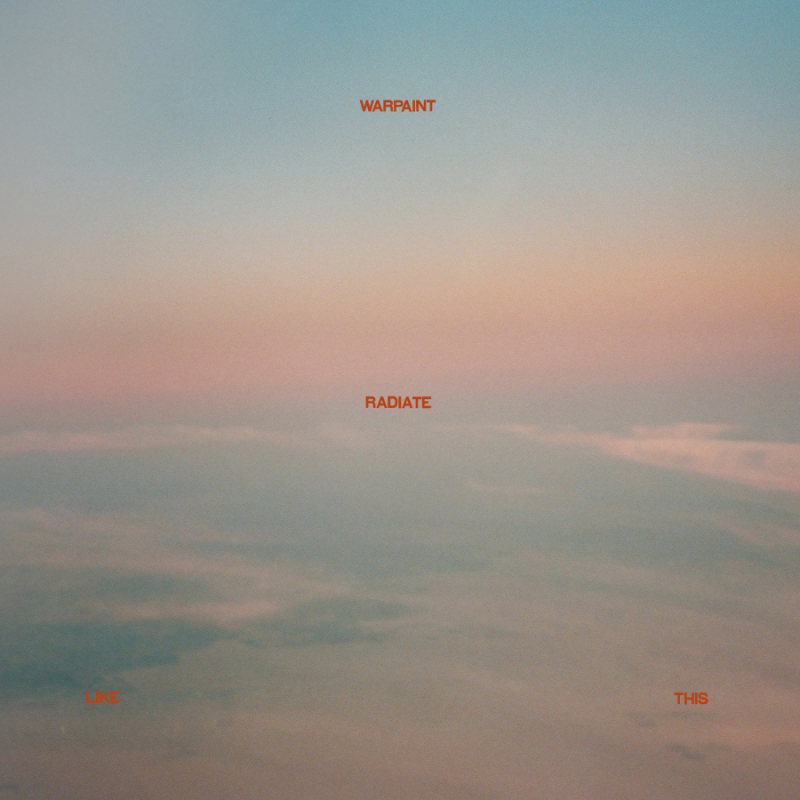Nach sechs Jahren kehren Warpaint mit ihrem vierten Album zurück. Radiate Like This erscheint am 6. Mai bei Heirlooms/Virgin Music. Das Quartett aus Los Angeles steht seit zwei Jahrzehnten für Aufbruch und waren eine der ersten erfolgreichen weiblichen Rockbands, die für viele Nachfolgerinnen als Inspiration gilt.
Nach ihrem Erfolg mit Heads Up 2016 waren Emily Kokal, Jenny Lee Lindberg, Stella Mozgawa und Theresa Wayman sehr beschäftigt mit dem sogenannten Leben. Babys, Jobs, Tourneen, Soloalben, interkontinentale und landesweite Umzüge wurden zu Prioritäten und stellten die Band vor immer größere logistische Herausforderungen, um wieder zusammenzukommen und erlaubten auch ein wenig Raum für den Gedanken “was wäre, wenn wir es nicht tun würden?“ Letztendlich fanden aber alle Frauen unaufhaltsam wieder zueinander zurück. Sie hatten gerade die grundlegenden Aufnahmen mit dem Co-Produzenten Sam Petts-Davies abgeschlossen, als die Pandemie ausbrach und sie gezwungen waren, sich in ihre jeweilige sichere Heimat zurückzuziehen. Was folgte, war die Entstehung eines völlig anderen Warpaint-Albums. Durch die Pandemie räumlich getrennt, nahm jede Musikerin ihre Parts separat auf, bevor sie sie an die nächste weitergab und die Songs so Schicht für Schicht geschaffen wurden.
Wir haben im März mit Jenny Lee Lindberg per Zoom über diesen anderen Entstehungsprozess gesprochen. Im Interview erzählt sie, warum ihr der Raum, ihre Ideen ohne unmittelbares Feedback zu entwickeln, viel bedeutet hat. Außerdem berichtet sie, dass sie gelernt hat, mit unterschiedlichen Visionen im Schreibprozess umzugehen und auch einmal einen Kampf aufzugeben. Wir erfahren, dass sich die Band selten einig ist und doch unmittelbar zusammengehört. Schließlich sprechen wir darüber, wie sich Warpaint-Songs durch Liveauftritte verändern und warum ihr eigentliches Leben vielleicht erst nach der Aufnahme und auf Tour beginnt.
Let’s talk about your fourth Warpaint record. It was and it is highly anticipated. How does it feel to have people inquiring about it at all stages of the process?
It did not feel like a lot of people were inquiring about the record while we were making it per se. Now that we have released a song and the actual album announcement, people know that there is something coming. And I feel there is probably anticipation from people out there in the world and there is also anticipation coming from us wondering how it is going to be perceived. That is always kind of a nerve-wracking place to be. You want to say, “It is what it is, you cannot do anything now”, but it has not been released. So, I am looking forward to it being released into the world. At that point, it is out of your hands and out of your control. People will like it or not, but you cannot do anything about that.

Is that a specific feeling for the time between finishing and publishing or does the anticipation towards the audience’s reaction also accompany the recording process?
I am not really thinking about that when we are in the studio. I feel like we all feel the same way about that when we are writing, we all want to enjoy it. We want to love the song so much, no matter what the song is. That is our main focus – that we like it and all four of us are on the same page about the direction we are heading. Once the recording is finished, the doubts come in. You second-guess yourself. We did have a lot of time. We had more time on this record than on any other record. So, that did happen a little bit. Once we recorded it and everything was done, you would sit with it for a little bit and you would think, “Oh, I do not like it, I want to do some big different thing”. Too much time is a little dangerous. Often, your first initial instincts and your first moves with the song are the best. They are more feeling-based. Once it is recorded, your nerves start acting up.
How did you make sure not to overdo it and to find the right time to stop editing? Does it help to be in a group in these situations?
From my point of view, there were moments where people were going back in and changing things and I really did not see it like that. I thought that it was beautiful, and I loved it as it is. That process was a little draining. If it is not broken, do not fix it. But then we had time, so if someone wanted to go down that road, they could. We tried to be there for each other and to be supportive and to trust that when somebody had an inkling that something was not right, we were letting them see it through, if they wanted to. In the end, we said, “You go ahead and do that and then let us just take a vote and see which version people like better”. That was a little heavy as it is not my favorite way to work.
It really comes down to a democratic vote when you disagree?
Yes, and sometimes you pick and choose. You pick your battles. All four of us being on the same page and agreeing, very rarely happens. We must meet in the middle somewhere. It is like a meter that you have to read. If three people are into something, you have to accept they are probably on to something. You have to practice seeing it from another perspective. That is not always easy, especially when you are making art with people. It gets pretty intense. Having to do that all the time is draining. But I learned this time around to put down the fight for what it is I want and to try and see where they are coming from. I respect them, I think they have great taste and I do not think they are trying to sabotage a song. You have to put your guards down and try to hear it from their ears. In 99 percent of the time, I can hear it.

Do you think that the space between you changed perspectives in the process?
I think, the separation was very refreshing for all of us. We had spent so many years together that there was something refreshing in the space. I can only speak for myself, but that is how I saw it. Being somewhere different, being out of the habitual with the band and our studio and our routines – it was nice getting out of LA. I had a whole new perspective of mind. Especially in the pandemic, we were forced to slow down. I feel like that was a nice touch for making this album – being able to be making things slow. Take the time to be intentional with the parts that you are coming up with. Having that space to be able to create, to record something, to come up with ideas, send them back and forth, but also having your own time to come up with those things was really nice. I would not want to do a whole album like that, but we did get a little bit of each. I think, it was important that everybody had their own space and their own time to come up with their parts, if they chose to. Some people in the band prefer being all together and writing that way. I like it half and half.
I imagine it to be so different not getting immediate feedback for ideas. I wonder if that makes you more or less confident to present them, if it changes your motivation to work on them, not knowing the reactions of the others.
I am good when I got a little fire under my butt or when something is keeping me on my toes. But there is also a sense of nervousness and insecurity. When those thoughts are coming to the creative process that might as well just be like poison. There is no fluidity, you do not feel free, you feel stifled. Physically, that is uncomfortable, let alone trying to be creative. The feedback is important. I tend to get that from people that are not in the band. I did a lot of the recording in my boyfriend’s studio in Utah, and I got his opinion, which was nice.
How did your experiences outside of Warpaint influence your work on the album?
I made my solo record when we were done recording. I made that record here in the last two years over the course of the pandemic. I was simultaneously doing some things with Warpaint, but most of my bits are done. They are so different. Usually, I have one song on the Warpaint record that I sing. I do not know why, but it always ends up this way. This time around, it was going to be the same, but I decided to keep it for my record. It felt a little out of place for the Warpaint record. For my solo stuff, I am singing everything and the way that I start that process is usually very basic with an acoustic guitar. The music is extremely different from Warpaint’s music. Especially this time around.
You postponed the release to be able to tour. Why was that important to you?
Touring is a core part of our band and our business. That is where our presence is the loudest. The touring and the releases of our music go hand in hand, they always have. We wanted to build some momentum around the release and the record, especially in Europe. It has been such a long time since we have been there. We were with Rough Trade for three of the albums and they are based in the UK, that is where our fans are. Not just the UK, but Europe is where we get the most love. It was important to have those two tie in. Not to mention that it is our job, we have to work – it is money, and it has been a minute… [laughs].
With Heads Up you avoided big headliner tours. How do you want to do it this time, what have you learned from that?
This time around, we will try to do little legs: a couple of weeks here, a couple of weeks there. To make a really good choice about where we play, what kind of shows we play. We want to branch out and maybe even do more different festivals than we have ever done, maybe even start a little festival of our own. We are trying to think outside the box. It has been so many years since we have been touring and we have always done the same thing. You do get burned out and we got burned out. This time around, we want to be a little more creative. Of course, we will play venues that we have played before, but to make it more fun for ourselves and not to go out on the road for so long. Emily also had a baby, she just turned two. She will be travelling with us; we will have to accommodate that.
You have been making music together for nearly 20 years now. What has changed and what has stayed the same?
[laughs] One joke is that I moved a lot. My houses got changed. I have lived in so many different houses. But we have grown up. We have raised each other. It still feels as if no days have gone by, but so much has changed. Emily married, she had a kid, I have moved to Utah. We all realized that we do not have to live in LA to do this band. That has changed, there is not the constant hanging out with each other all the time. Our personalities have stayed the same, but our live situations are all different from when we met each other.

You worked with Sam Petts-Davies for the first time. How was it to work with someone outside your group?
He co-produced the album with us. Our dynamic with the four of us is pretty complicated in itself. Coming to a unite as in a band is very difficult and challenging. I appreciate and invite other perspectives into our band and our process. I like meeting up with other people. Sometimes we are so subjective to our project that it is hard to think outside of that box or outside of myself even. I am just stuck in that way and then you have three other people being stuck in that way, it is almost like Stalemate with chess. It is not always like that, but when it is the most difficult, it feels like a Stalemate. We obviously trust the person enough to invite them into the process and I enjoy having that other energy in the room. Some of us do not, but I do. I think it is helpful.
In an old interview you said that you liked your second album better than the first one. Did it continue like this? Is Radiate Like This the best Warpaint album so far in your opinion?
It is the most mature. It feels like there are more classics on this album than on the others. I think, sonically it sounds the best. But with that being said, I love Heads Up and a lot of songs on that album a lot. I know that other band members do not agree, so…. They all have different favorites. Also, once we go out on the road and play the songs, they take on new forms. We have been told countless times that we are better live, and I think that is because we go out and play the songs so much, they become something different, and they become better than the album versions. They have got more work in them, more hours in them.
I should probably ask you again after the tour then.
Yes, playing the songs is extremely fun, but I miss an element of us, when we were on our first record. We really were rocking out with each other and there was lots of jamming going on. We have been doing that less and less as the years went on with the different records. It would be nice to make a record where we are playing live together. We have never done that.
Thank you for the interview!









